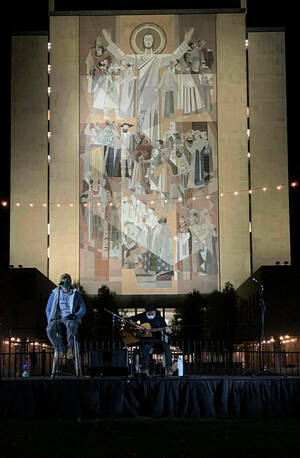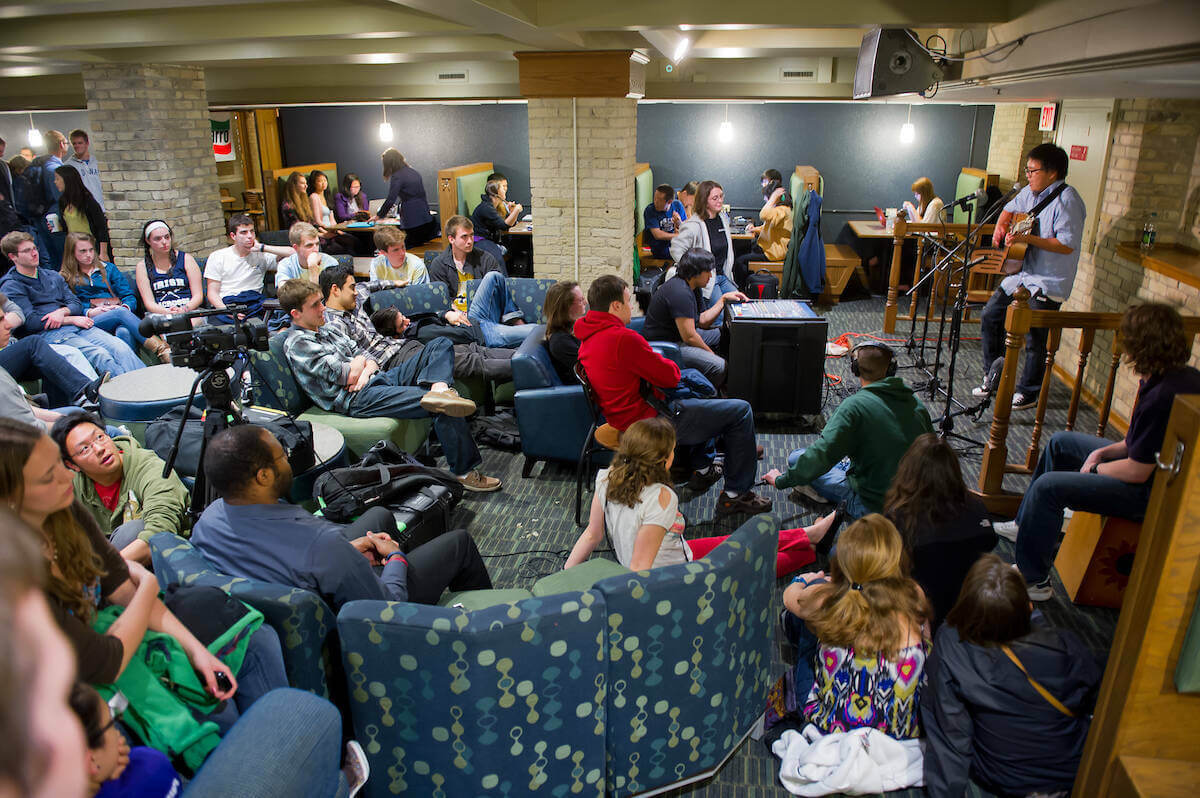
Autumn nights in South Bend are great for fire pits and woolen mittens, two things I envied as I looked out over the green lawn stretching towards Notre Dame Stadium.
My own fingers had turned white from the cold, and I could barely place them where I wanted them on the six strings of the guitar in my hands. I knew that once this song finished, before I passed the instrument back to my dormmate Jae (who was nodding in encouragement as he furiously blew steamy breath into his cupped hands), the strings would have shivered out of tune, and we would need to adjust them. Again.
We should have heeded the warnings a few weeks earlier. October winds had sidelined our percussionist, who had played his hands numb on the cajon (a small South American drum) and decided he was done with the outdoor performances for the semester. But it was our last Acousticafé of the fall, and Jae and I had committed to closing out the season strong.
I performed in my first Acousticafé in January 2020, and later that same night I heard the word “coronavirus” for the first time. Since then, I’ve attended these weekly open-mic nights over Zoom, at outdoor stages around campus, and at Acousticafé’s current home in the Hagerty Family Cafe. The resilient tradition found new life during the pandemic, serving as entertainment and a reason to gather during a semester of exclusively socializing outside.
When the event launched in the late 1990s, audiences crammed into the basement of LaFortune Student Center each Thursday night to see their friends and classmates. The weekly staple also made appearances at Reckers, Legends, even the porch of Badin Hall, but LaFun remained its permanent home until 2018, when it migrated to Duncan Student Center.
With pandemic restrictions limiting indoor activities in autumn 2020, Acousticafé migrated to the newly created Library Lawn. Catherine Fitzpatrick, former lead programmer for Acousticafé, welcomed the convenient new venue in an otherwise uncertain semester.
“Coming into the fall semester, we weren’t really sure what we were going to be able to do,” she told The Observer. “So when Library Lawn was set up, that was a nice surprise.”
Some of my best memories from fall 2020 are of September evenings when the sun was going down and the fire pits were lighting up. People brought blankets to Library Lawn, the University sometimes provided snacks, and everyone seemed excited to be there. To me, outdoor Acousticafé performances represented the semester in miniature: every so often, we could forget the disappointment and isolation of college during the pandemic and feel grateful to be there at all.
The shows mean just as much to the performers as the fans. Many Notre Dame alumni who went on to careers in music have played the stuffy basement of LaFortune, including Tim Ferrell of Ludo and the duo Frances Luke Accord. The low-tech nature of Acousticafé brings amateurs working through their college bucket lists together with serious musicians who already have substantial fanbases.
Joel Cummins of Umphrey’s McGee told Scholastic in 2006, “When we were here, there was no live music club with a PA. We had to learn how to do our own show; once we did that, we could take it anywhere.”

Even during the pandemic, Acousticafé retained its diverse character. I think the listless attitude on campus last year brought new voices to the mics. Most Thursdays, I was shocked to hear the talent of my unassuming and sometimes shy classmates. Others had already proven themselves as performers. Out on Library Lawn, I shared the stage with my incredibly talented roommate Troy McFarland ’22, who garners a few thousand listeners on Spotify each month under the moniker Cardnl.
The bliss of warm and well-attended performances blew away with the autumn leaves. By that freezing cold gig in late October, it was really just my devoted girlfriend wrapped in a hat and scarf cheering for us.
Even the long winter break couldn’t shutter Acousticafé. In the spring semester, performers moved inside to the South Lodge, a pop-up social spot that the University put together. The return of milder weather brought back outdoor performances.
Many of us miss performing outdoors now that Acousticafé has returned to its Hagerty stage, but with a mostly normal social scene in fall 2021, the changes instituted during the peaks of the pandemic have faded as people resumed college life.
But no matter its form, Acousticafé lives on. For many, I’m sure, it’s just something to walk past on Thursday evenings in Duncan Student Center. Maybe you take out an earbud to listen for a second as you search for a table.
For some, though, especially at the height of the pandemic, Acousticafé was a focal point of community when we needed it most.
Chris Parker, a senior studying classics and journalism, was this magazine’s fall semester intern.